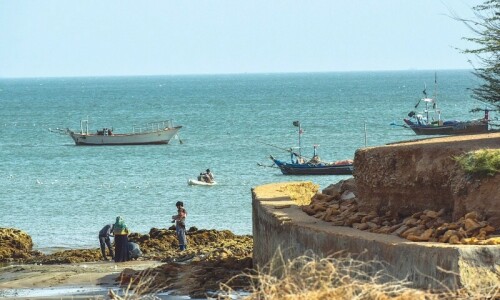• Arif Hasan says many families are sending only one of their children to school due to poverty
• Calls for taking old buildings of the city into consideration in climate change discussions

KARACHI: The inauguration ceremony of the second edition of five-day winter school “Environmental Change, Societies at Risk and Social Vulnerabilities in South Asia,” at the Institute of Business Administration (IBA) began with insightful discussions by experts who shed light on factors shaping environment and societies.
The event was organised by IBA in collaboration with the Centre for South Asian and Himalayan Studies in Paris (CESAH, CNRS-EHESS) here on Monday.
In his keynote address, architect and town planner Arif Hasan spoke not only on the technical affects of climate change, but also on the effects of climate change on the social relations of the city.
He talked about societal and infrastructural problems of Karachi as well as highlighted its diversity. He said that in the larger context of Pakistan, Karachi was unique.
Pointing out the ethnic diversity of Karachi, Mr Hasan said: “Lahore is 80.94 per cent Punjabi speaking and Peshawar is 90.17pc Pashto and 5.33pc Hindko speaking. Around 42.30pc of Karachi’s population is Urdu speaking and 10.67pc is Sindhi speaking. There are 18 different languages spoken in Karachi. Even pre-Partition settlements here have different ethnicities with multi-ethnic residential areas.”
But political turmoil in the 1990s saw the residents of the city divided, with security also becoming a concern of the people. Suddenly, those who could afford it, built tall walls giving out an impression of living in prisons.
At the same time, there were also the majority of people in Karachi who could not even afford a roof over their head as they didn’t have land, which was beyond their financial means. They built makeshift settlements, known as katchi abadis. As land was scarce, they expanded horizontally. They built five- to six-storey structures with shops emerging on the ground floors, with hardly any ventilation.
Pointing out the social problems that emerged in this context, he said all this also brought up the issue of education.
“Many can only educate one child and choosing that child is a difficult decision. It gives rise to jealousy. The children who don’t go to school learn some skills but if the child is a girl she doesn’t even get that which leaves her with no good working opportunities. They work as salesgirls or at pharmaceutical or garment factories,” he said.
He shared that some old surveys showed that there were women in Karachi who had never even seen the sea. “There are women here who have never been out of their neigbourhoods,” he said, adding that their only windows to the world were Pakistani television plays and Indian programmes.
Finally, he said that it was now fashionable to talk about climate change and the environment with new ideas for new buildings and settlements. “But what about the old buildings and settlements? They will remain overly populated with no parks or jogging tracks and without any cross ventilation with untreated sewage water being channelled out to the sea. It has its repercussions,” he pointed out.
Prof Nausheen H. Anwar, the founding director of the Karachi Urban Lab, spoke about extreme heat and how it was affecting one-tenth of the Earth’s land area, with an eight-fold increase in record-breaking hot months over the past decade leading to deaths and bodily harms.
“An Intergovernmental Panel on Climate Change report has underscored that increasing heat and humidity will create conditions that test human tolerance. These will also impact the interconnected food-livelihoods-water-energy-health systems,” she said.
“Heat is largely understood in terms of temperature or as a disembodied and apolitical thing with no history and detached from lived experiences embedded in the built environment. However, for ordinary citizens, experiences of heat or thermal suffering are bodily and political. They present new kinds of risks in an age of global warming,” she said.
Geographer from Paris, Dr Sylvie Fanchette talked about highly populated deltas facing climate and environmental changes. “Deltas have a long record of adapting to natural hazards. They are accustomed to being highly exposed to environmental risks,” she said.
“Still, they are among the most affected by climate and environmental changes because they are low lying areas and host a high density of vulnerable populations affected by hazards. Their future depends on the nature of negotiations among riverine countries and local policy, and on how they are integrated in globalisation and coastalisation of their economies,” she added.
Associate Professor Climate Change and International Development Studies at the Utrecht University in the Netherlands, Dr Bishawjit Mallick spoke about ‘Voluntary non-migration and environmental risk’. His paper explored environmental non-migration based on the notion that factors of livelihood resilience could describe the decision of non-migration.
Earlier, IBA Executive Director Dr S. Akbar Zaidi, geographer Dr Remy Delage and Michael Boivin of CESAH, CNRS-EHESS welcomed the students and other participants of the Winter School.
Published in Dawn, December 12th, 2023












































Dear visitor, the comments section is undergoing an overhaul and will return soon.